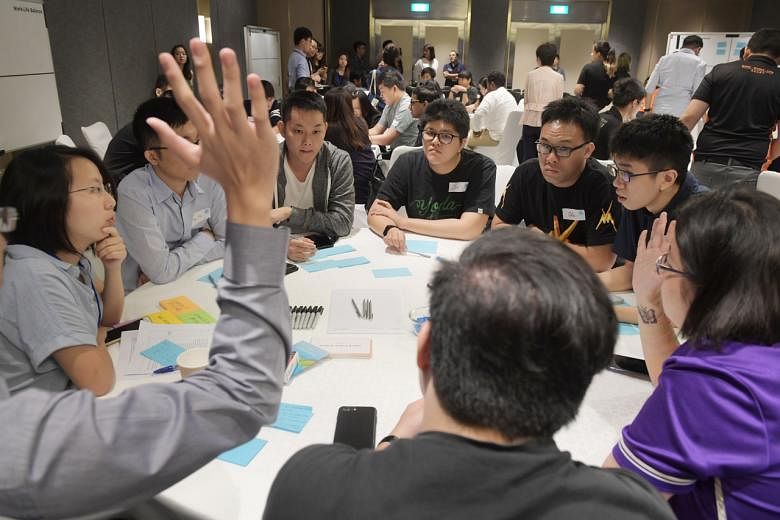SINGAPORE - A group of three young people is hoping its ideas can help improve the current support available for youths at risk, and prevent any re-offending.
Ms Celeste Tang, 22, Ms Amanda Ong, 24, and Mr Frederick Lim, 28, met each other through the Youth Action Challenge, a programme organised by the Ministry of Culture, Community and Youth and the National Youth Council under the SG Youth Action Plan.
Their team, along with more than 40 groups of young people, will be pitching their ideas to create change in Singapore to various panels of judges.
The 12 best teams will be selected as finalists to attend the Youth Action Challenge Summit in April, where they will pitch their ideas to 4G leaders, industry experts and key youth leaders in the hopes of receiving up to $50,000 in grants to put their ideas into action.
Ms Tang, a sports science and management student minoring in youth work and guidance at Nanyang Technological University, Ms Ong, a sociology graduate from National University of Singapore, and Mr Lim, an infocomms student at the Institute of Technical Education College Central, hope to create a movie and short films to help Singaporeans understand the situations of youths at risk.
They also want to start a structured mentorship and befriender programme for these young people, where they can also be trained to become certified mentors for other youth at-risk.
"We realised that Singaporeans really lack a general understanding and empathy towards this group of people. We often just criticise them as people who are 'bad students' and we don't realise why they actually end up in such circumstances," said Ms Ong.
The team believes there should be more public conversations on this segment of society and more help should be given to them, especially if they are coming out of the Singapore Boys' Home or Singapore Girls' Home after many years and do not have sufficient support.
The team pitched its ideas to a panel of judges at a session at Temasek Shophouse in Dhoby Ghaut on Saturday.
Topics other groups spoke on include empowering persons with disabilities, providing a safe space to discuss race and religion issues, and introducing art therapy to maintain mental wellness.
On the same day, Minister for Culture, Community and Youth Grace Fu announced the Youth Action Challenge at the National Youth Council's youth engagement session at Raffles City Convention Centre.
In her speech, she also said she is optimistic about Singapore because she has encountered many Singaporeans who have made choices that gave her the confidence.
She highlighted several examples, such as participants of the Young Leaders' Programme at the 2019 International Conference on Cohesive Societies.
The young people of different races, religions and organisational backgrounds exchanged notes on building social cohesion in their respective fields, and many continued to do so after the conference, while some have started collaborative projects, said Ms Fu.
"When I reflect on their achievement, I am convinced that the Government's role is not just about law and order. It must do more to empower more people to be the positive social change they want to see. We must work with Singaporeans as partners," she said.
"As Government, we help bring various stakeholders together to jointly develop the best solution for our shared concerns; we facilitate dialogue between different groups, create platforms for citizen action, and support with resources," she added.
Senior Minister of State for Communications and Information and for Culture, Community and Youth Sim Ann, speaking to the media after the engagement session, spoke on her experience as a panel judge for a Youth Action Challenge pitch session where she heard ideas from 13 teams, including that of Ms Tang, Ms Ong and Mr Lim.
"The youth are very observant, they are able to point out policy gaps or somewhere where a public service may not meet all the intended beneficiaries," said Ms Sim.
"There are also some who point out that there are perhaps also some shortcomings in communications, where sometimes good ideas, good schemes and assistance plans are just quite not able to connect with the people whom they're designed to help," she said.


